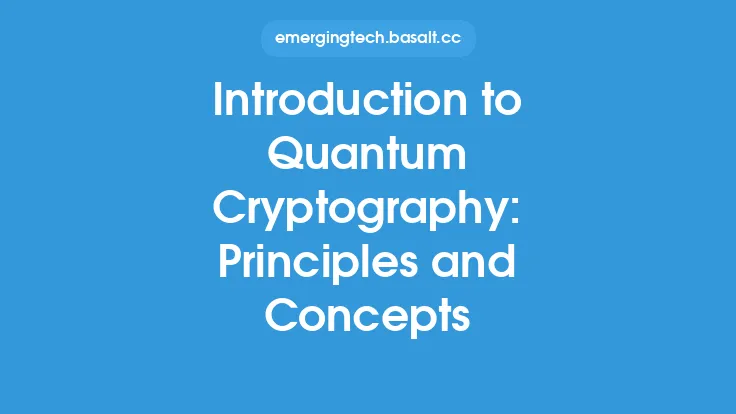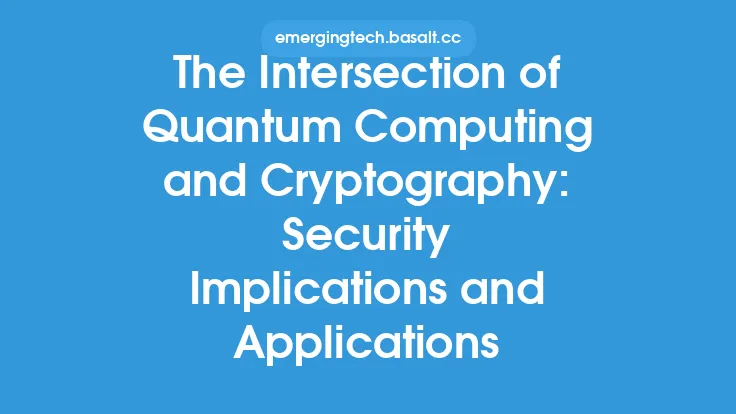The concept of quantum computing has been gaining significant attention in recent years, and for good reason. This revolutionary technology has the potential to solve complex problems that are currently unsolvable with traditional computers. At its core, quantum computing is based on the principles of quantum mechanics, which describe the behavior of matter and energy at the smallest scales. In this article, we will delve into the basics and principles of quantum computing, exploring the fundamental concepts that underlie this exciting field.
What is Quantum Computing?
Quantum computing is a type of computing that uses the principles of quantum mechanics to perform calculations and operations on data. Unlike classical computers, which use bits to represent information, quantum computers use quantum bits or qubits. Qubits are unique in that they can exist in multiple states simultaneously, allowing for the processing of vast amounts of information in parallel. This property, known as superposition, enables quantum computers to solve certain problems much faster than classical computers.
Quantum Computing Principles
The principles of quantum computing are based on the principles of quantum mechanics. These principles include superposition, entanglement, and wave-particle duality. Superposition refers to the ability of a qubit to exist in multiple states simultaneously, while entanglement refers to the ability of two or more qubits to become connected in such a way that the state of one qubit is dependent on the state of the other. Wave-particle duality refers to the ability of particles, such as electrons, to exhibit both wave-like and particle-like behavior. These principles are fundamental to the operation of quantum computers and are used to perform calculations and operations on data.
Quantum Computing Hardware
Quantum computing hardware is still in the early stages of development, but several types of quantum computers have been built. These include gate-based quantum computers, which use quantum gates to perform operations on qubits, and adiabatic quantum computers, which use a process called quantum annealing to find the optimal solution to a problem. Other types of quantum computers include topological quantum computers, which use exotic materials called topological insulators to perform calculations, and quantum simulators, which are used to simulate the behavior of quantum systems.
Quantum Computing Software
Quantum computing software is also still in the early stages of development, but several programming languages and frameworks have been created to support the development of quantum algorithms. These include Q# from Microsoft, Qiskit from IBM, and Cirq from Google. These languages and frameworks provide a way for developers to write quantum algorithms and run them on quantum hardware. They also provide a range of tools and libraries for tasks such as quantum simulation, quantum machine learning, and quantum optimization.
Quantum Computing Applications
Quantum computing has a wide range of potential applications, from cryptography and optimization to machine learning and simulation. Quantum computers can be used to break certain types of encryption, such as RSA and elliptic curve cryptography, but they can also be used to create new, quantum-resistant encryption algorithms. Quantum computers can also be used to optimize complex systems, such as logistics and supply chains, and to simulate the behavior of complex quantum systems, such as molecules and materials.
Challenges and Limitations
Despite the potential of quantum computing, there are several challenges and limitations that must be overcome. One of the main challenges is the development of reliable and scalable quantum hardware. Quantum computers are prone to errors, and the number of qubits required to solve complex problems is still relatively small. Another challenge is the development of practical quantum algorithms that can be used to solve real-world problems. While several quantum algorithms have been developed, such as Shor's algorithm and Grover's algorithm, these algorithms are still largely theoretical and have not yet been widely adopted.
Future Directions
The future of quantum computing is exciting and rapidly evolving. Several companies, including Google, Microsoft, and IBM, are investing heavily in the development of quantum computing hardware and software. Governments and research institutions are also investing in quantum computing research, and several breakthroughs have been made in recent years. One of the most significant breakthroughs was the development of a 53-qubit quantum computer by Google, which was used to perform a calculation that was beyond the capabilities of a classical computer. This breakthrough demonstrated the potential of quantum computing and has sparked a new wave of interest and investment in the field.
Conclusion
In conclusion, quantum computing is a rapidly evolving field that has the potential to solve complex problems that are currently unsolvable with traditional computers. The principles of quantum computing, including superposition, entanglement, and wave-particle duality, are fundamental to the operation of quantum computers and are used to perform calculations and operations on data. While there are several challenges and limitations that must be overcome, the future of quantum computing is exciting and rapidly evolving. As research and development continue to advance, we can expect to see new breakthroughs and innovations in the field, and the potential applications of quantum computing are vast and varied.





